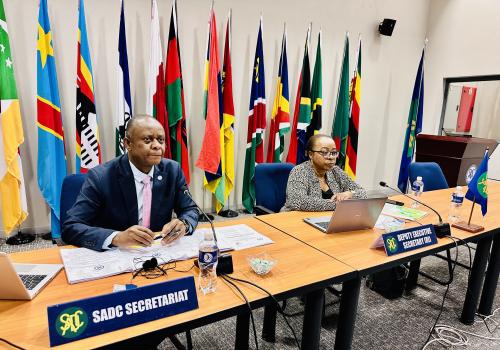The Southern African Development Community (SADC) Ministers responsible for Agriculture, Food Security, Fisheries and Aquaculture met through videoconferencing on 19 May 2023, to review progress in the implementation of the SADC relevant sectoral programmes, projects, and related strategies under the Regional Agricultural Policy (RAP), in line with the Regional Indicative Strategic Development Plan (RISDP) (2020-2030).
The meeting was chaired by Hon. Adrien Bokele, Minister of Fisheries and Livestock of the Democratic Republic of Congo and attended by 80 delegates from Angola, Botswana, Democratic Republic of Congo (DRC), Eswatini, Lesotho, Madagascar, Malawi, Mauritius, Mozambique, Namibia, Seychelles, South Africa, United Republic of Tanzania, Zambia, and Zimbabwe.
The SADC Deputy Executive Secretary responsible for Regional Integration, Ms. Angele Makombo N’tumba, welcomed all the Ministers on behalf of the Executive Secretary, His Excellency Mr Elias M. Magosi and wished them fruitful deliberations. During her welcoming remarks, the Deputy Executive Secretary highlighted that the region experienced numerous challenges in recent times, including severe droughts and floods which adversely affected the agricultural sectors and food security. As a result, this led to the loss of, lives, revenue, jobs, and livelihoods. She added that overfishing led to a depletion of fish stocks, thereby affecting the livelihoods of many citizens in the coastal towns, hence the need for sustainable solutions to improve food security.
The Chairperson of the Meeting, Hon. Bokele, called on the Ministers to prioritise the development and implementation of policies and programs that promote access to nutritious food, especially for the vulnerable members of society.
Hon. Bokele highlighted that the region faced threats from overfishing, illegal and unregulated fishing, pollution, and destruction of habitats and called for the adoption of practices that promote conservation and sustainable exploitation of fisheries and aquatic resources while ensuring that those who depended on these resources for their livelihoods benefited from them.
The following are some of the key outcomes of the Meeting.
- The Ministers noted with great concern, the high numbers of food and nutritionally insecure people in the Region (57.8 million which is an increase from 50.8 million the previous year) and urged Member States to continue implementing and domesticating the SADC Food and Nutrition Security Strategy (FNSS) in National Food and Nutrition Strategies to improve food and nutrition security. They urged Member States to enhance early warning systems and early action in order to reduce the impact of disasters; accelerate adaptation to climate change including promoting irrigation and climate smart agriculture, as well as water harvesting and storage from heavy rains to be used during drier periods; and, put in place coordinated and timely scaling up of multi-sectoral humanitarian assistance to prevent extreme food insecurity and acute malnutrition outcomes and excess mortality.
- The Ministers noted the reports of outbreaks of transboundary animal diseases such as the foot and mouth disease, Avian influenza in some Member States which threatened normal trade in the region and urged Member States to continue implementation of strategies developed under the Livestock Development Programme.
- The Ministers considered and approved several strategies and policies including: the Regional Irrigation Policy Regional; The Lilongwe Declaration-towards a Regional Dialogue to build resilience and adaptation in artisanal fisheries and aquaculture in Southern Africa; and The Carcass and Live Animal Classification recommendations and urged Member States to implement them.
The Ministers noted the crucial role played by the Centre for Coordination of Agricultural Research and Development for Southern Africa (CCARDESA) in supporting National Agriculture Research Centres implement climate smart agriculture solutions to enhance food security and the need for resources to strengthen their role in agricultural transformation and regional integration. They commended the United Republic of Tanzania and the Kingdom of Lesotho for completing payments of annual contributions to and encouraged all Member States to fulfil their annual payments.
The Ministers commended Member States that have signed several legal instruments necessary for implementing programs crucial for agriculture and food security in the Region, including the Charter establishing the SADC Regional Fisheries Monitoring Control and Surveillance Coordination Centre (MCSCC), Protocol on Plant Variety Protection, and the Seed Charter and encouraged those that have not to do so. The Ministers also commended the Government of the Republic of Mozambique for hosting the MCSCC, and approved processes towards establishment of the SADC Regional Fisheries Monitoring, Control and Surveillance Coordination Centre (MCSCC) following entry into force of its Charter on 08 April 2023.
The Ministers commended various partners namely, the African Regional Standardisation Organisation (ARSO), the European Union (EU), Food and Agriculture Organisation (FAO), FishFORCE Academy, German Government including GIZ, Lilongwe University of Agriculture and Natural Resources (LUANAR), United Nations Children and Education Fund (UNICEF), United Nations Industrial Development Organisation (UNIDO), World Organisation of Animal Health (WOAH), Stop Illegal Fishing (SIF), Water Research Commission (WRC), WorldFish, and World Wide Fund for Nature (WWF) for supporting the implementation of regional programmes and the operationalisation of the Regional Agriculture Investment Plan (RAIP).
The Joint Committee of Ministers responsible for Agriculture and Food Security, Fisheries and Aquaculture is directly responsible for overseeing the activities in the agriculture, food security, and fisheries and aquaculture sectors to promote regional integration as guided by the Regional Indicative Strategic Development Plan (RISDP) (2020-2030), as well as providing policy advice to the Council of Ministers.

